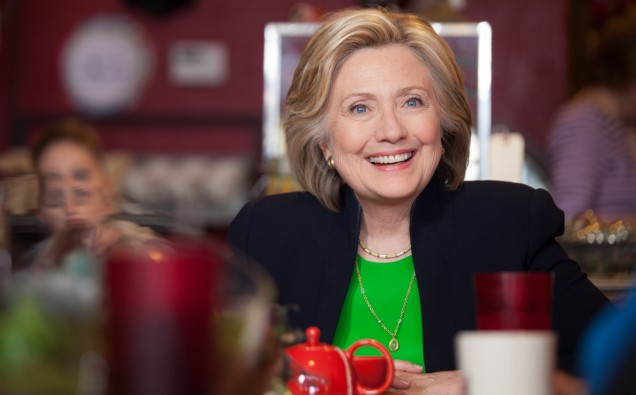
With Super Tuesday contests just days away, Democratic presidential candidate Hillary Clinton has some positive vibes coming out of Virginia, one of the 11 states going to vote on March 1.
A Monmouth University Poll, released Thursday, finds a 60 percent support for the former secretary of state among primary voters over party rival Senator Bernie Sanders’ 33 percent.
On Saturday, the two Democrats are also fighting for votes in he South Carolina primary in the race to win nomination for November 2016 presidential election, being held after two terms of President Barack Obama. Analysts see Clinton advantageously positioned due to a large backing among African-Americans in the state. But Sanders’ appeal to younger voters of almost communities has surprised many political watchers, adding a spice to the Democratic race for nomination.
On the Republican side, the poll says billionaire businessman Donald Trump dominates the Old Dominion, earning the support of 41% of likely GOP primary voters. Marco Rubio, who mounted a fierce challenge to Trump’s campaign in the latest debate Friday, is currently in second place at 27%, followed by Ted Cruz (14%), John Kasich (7%), and Ben Carson (7%).
The Super Tuesday showings will determine how far Hillary Clinton, who at the moment has 52 pledged delegates, is able to emerge as the clear choice for the Democrats over Sanders, who has 51 pledged delegates. However, Clinton has the backing of 453 super delegates compared with Sanders’ modest 19 super delegates.
Despite Trump’s success in the primary season so far, the Republicans field remains open, with the party leaders anxiously awaiting the outcome of the three-way tussle involving an outspoken Trump (87 delegates), a recovering Rubio (16 delegates) and a struggling Cruz (17 delegates).
Alabama, Arkansas, Colorado, Georgia, Massachusetts, Minnesota, Oklahoma, Tennessee, Texas, Vermont and Virginia will hold nominating contests for both parties.
Seeking to consolidate her position as the lead Democratic choice for nomination in the March 1 Super Tuesday fights, Clinton currently leads among both white (58% to 39%) and black (70% to 19%) voters in the Commonwealth of Virginia. Among men she has a 59% to Vermont Senator Sanders’ 37% and among women she currently fares 61% to 31% over her rival.
The Monmouth University poll tells that voters age 50 and older favor Clinton 74% to 22% for Sanders. The poll was conducted by the Monmouth University Polling Institute from February 22 to 24, 2016 with a statewide random sample of Virginia voters drawn from a list of registered voters.
The voters participated in a primary election in 2012, 2013 or 2014 or voted in at least two of the last three general elections, and indicate they will vote in the presidential primary on March 1, 2016
However, the poll shows the two candidates are basically tied among voters under 50 years old at 46% for Sanders and 45% for Clinton.
“The ace in the hole for Sanders so far has been younger voters. But this group is not giving him quite the same advantage in Virginia as it had in prior contests,” said Patrick Murray, director of the independent Monmouth University Polling Institute.
Nearly 3-in-4 Virginia Democrats say that Clinton would do either an excellent (26%) or good (47%) job addressing the most important concerns of families like theirs, the poll says.
This compares to 6-in-10 who say the same about Sanders (21% excellent and 40% good).
Significantly, nearly half (47%) of likely Democratic primary voters say that they are completely decided on their candidate choice. Supporters of Sanders (52%) and Clinton (50%) are equally as likely to say their vote is locked in. Another 29% of Democrats have a strong candidate preference but are still open to considering others. About 1-in-4 either have only a slight preference (10%) or are really undecided (13%).
The poll was conducted by telephone from February 22 to 24, 2016 with 421 Virginia voters likely to vote in the Republican presidential primary and 302 Virginia voters likely to vote in the Democratic presidential primary.
The Republican likely primary voter sample has a margin of error of +4.8 percent and the Democratic likely primary voter sample has a margin of error of + 5.6 percent.
As for the GOP trends in Virginia, the findings show that male voters give Trump (49%) a strong advantage over Rubio (23%) and Cruz (15%), while women more narrowly prefer to Trump (33%) to Rubio (30%). Trump leads among nearly every other demographic group, though, with some of his strongest support coming from voters who have only a high school education (54%).
“Trump said he loves the poorly educated and apparently they love him back,” says Murray.
Quite interestingly for both Democrats and Republicans, just over one-third (36%) of likely Republican primary voters say that they are completely decided on their candidate choice just days before Tuesday’s election. Another 40% have a strong preference but are still open to considering other candidates. One-in-four either has only a slight preference (12%) or are really undecided (12%). More than half (53%) of Trump voters, though, say their vote choice is locked in.
Meanwhile, according to a Washington Post-Univision News national poll, reported Thursday, 8 in 10 Hispanic voters have an unfavorable view of Trump.
The poll reveals that more than 7 in 10 who have a “very unfavorable” impression of Trump, who has been using a harsh rhetoric against Mexican and Muslim minorities. The WP-Unison News poll detects Democratic Hillary Clinton 2 to 1 advantage among Hispanics over Senator Sanders.












